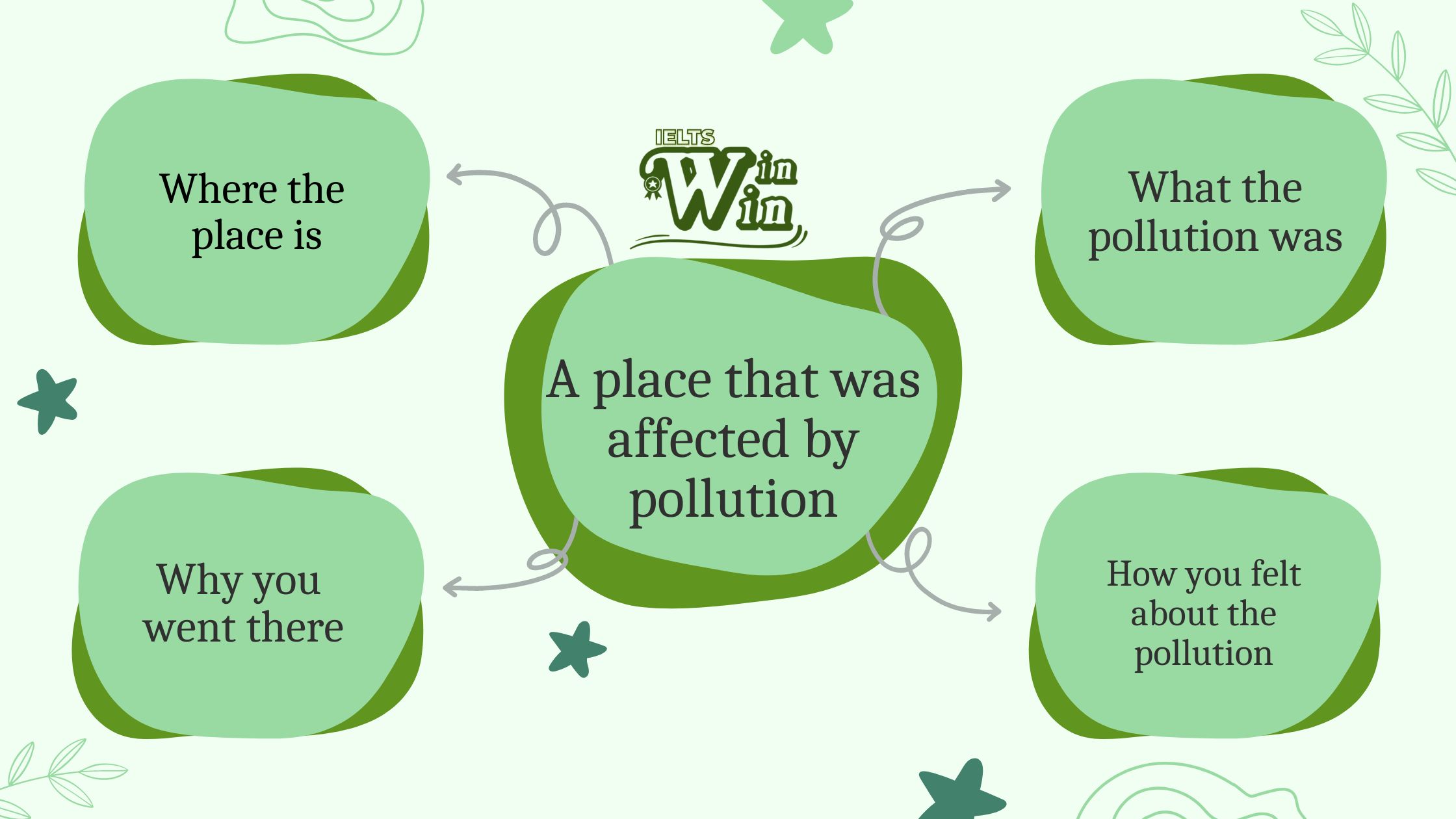✨Part 2: Describe a place you visited that was affected by pollution.
You should say:
- where the place is
- what the pollution was
- why you went there
- and explain how you felt about the pollution
This question instantly makes me think about Vung Tau Beach, which has been heavily polluted with plastic waste.
Several months ago, my family and I took a trip to Vung Tau, which is only a three-hour ride from HCMC, after a nerve-racking time of studying. I had hoped to spend a few nice days on the sandy beach, breathe in some fresh air, and soak up some sun. However, the reality in Vung Tau left me feeling disheartened and disappointed. There were tons of plastic bags, bottles, straws, dead seashells, and tree branches on the beach, which completely spoiled the natural beauty of the place. There was literally no space for me to lay out my towel and enjoy sunbathing. When I went for a swim, I could feel a plastic bag wrapping around my legs and it ruined my entire experience. And, you know, every wave that crashed onto the shore brought along countless pieces of man-made plastic debris. This made me feel upset because, in my childhood memories, Vung Tau was a beautiful and unspoiled destination with tranquil waters and spotless white sand.
The next morning, while having breakfast near the beach, I saw some people from the waste treatment team cleaning up the beach. I really appreciated their efforts, as it showed that there were still responsible people who cared about the marine flora and fauna and the country's natural places. I ran down and offered to help. Although one morning was not enough to fully clear the huge amount of plastic waste in the sea, it was an eye-opening experience for me. I realized the importance of regularly participating in environmental practices and the need for sustainable growth.
- Plastic waste: /ˈplæstɪk weɪst/ (n) - chất thải nhựa
- Nerve-racking time: /nɜrv ˈrækɪŋ taɪm/ (n) - khoảng thời gian căng thẳng, lo lắng
- Soak up: /soʊk ʌp/ (v) - hấp thụ, hút vào
- Disheartened: /dɪsˈhɑrtnd/ (adj) - chán nản, nản lòng
- Sunbathing: /ˈsʌnbeɪðɪŋ/ (n) - tắm nắng
- Debris: /ˈdɛbri/ (n) - mảnh vỡ, mảnh vụn
- Tranquil: /ˈtræŋkwɪl/ (adj) - yên bình, thanh bình
- Spotless: /ˈspɑtlɪs/ (adj) - sạch sẽ, không tì vết
- Marine flora: /məˈrin ˈflɔrə/ (n) - thực vật biển
- Fauna: /ˈfɔnə/ (n) - động vật
- Eye-opening experience: (idiom) - trải nghiệm mới mẻ, đầy sự bất ngờ
- Sustainable: /səˈsteɪnəbl/ (adj) - bền vững, có thể duy trì được
PART 3
✨What kinds of pollution are serious in your country?
The types of pollution that Vietnam is facing are varied, but among the most severe are water pollution and air pollution. The surge of private transport, especially in the number of motorbikes, is one of the major contributors to air pollution. In urban areas, the average Vietnamese household owns around 2 to 3 motorbikes, and the massive number of these vehicles results in the emission of tons of CO2 into the atmosphere. Water pollution is also a severe problem in my country, with the increasing number of factories and industries causing a rise in industrial waste. Many of these facilities release untreated wastewater directly into rivers, lakes, and oceans, which leads to water contamination and puts both marine life and public health at risk.
- Surge: /sɜrdʒ/ (n) - sự tăng đột ngột, sự bùng nổ
- Emission: /ɪˈmɪʃn/ (n) - khí thải
- Severe: /sɪˈvɪr/ (adj) - nghiêm trọng, gay gắt, khắc nghiệt
- Wastewater: /ˈweɪstˌwɔtər/ (n) - nước thải
- Contamination: /kənˌtæmɪˈneɪʃn/ (n) - sự ô nhiễm, sự làm bẩn
✨What can individuals do to protect the environment?
One way individuals can contribute to environmental protection is by adopting daily habits that align with the 3Rs: reduce, reuse, and recycle. This involves minimizing the use of single-use plastics, finding ways to reuse items instead of discarding them, and properly recycling materials that are marked as recyclable. Eco-friendly products such as grass straws, paper cups, and reusable bags can be used as alternatives to traditional plastic products. People can also reduce their carbon footprint through the use of public transportation for their daily commute, rather than relying on personal vehicles such as motorbikes and cars.
- Discarding: /dɪsˈkɑrdɪŋ/ (n) - sự vứt bỏ, sự loại bỏ
- Alternatives: /ɔlˈtɜrnətɪvz/ (n) - các phương án thay thế, lựa chọn khác
- Commute: /ˈdeɪli kəˈmjuːt/ (n) - hành trình đi lại hàng ngày giữa nhà và nơi làm việc hoặc học tập.
✨Why should the government be involved in environmental protection?
The government has control over the authority and assets that can greatly motivate individuals to engage in practices aimed at protecting the environment. The government can impose regulations and policies to encourage collective environmental protection efforts among businesses and individuals and penalize those who disregard them. Also, by utilizing government funding, they can invest in initiatives such as public awareness campaigns for environmental protection, or developing technologies like improved wastewater treatment systems, for instance.
- Impose: /ɪmˈpoʊz/ (v) - áp đặt, đánh thuế
- Regulations: /ˌrɛɡjʊˈleɪʃənz/ (n) - quy định, quy tắc
- Penalize: /ˈpinəˌlaɪz/ (v) - trừng phạt, xử phạt
- Initiatives: /ɪˈnɪʃətɪvz/ (n) - các hoạt động, các chương trình khởi xướng
✨Is it important to teach students about environmental protection at school?
It's super important for students to get educated on environmental issues. Schools play a major role in shaping the attitudes and behaviours of young people, so teaching them about the challenges that our planet is facing and how to be eco-friendly is key to creating a more conscious generation. When students understand the importance of conservation and sustainable practices, they’re equipped with the knowledge and skills to preserve and protect the environment from further harm. This isn't just good for them, it's good for everyone!
- Attitudes: /ˈætɪtjuːdz/ (n) - thái độ, tư thế
- Eco-friendly: /ˈikoʊ ˈfrɛndli/ (adj) - thân thiện với môi trường
- Sustainable: /səˈsteɪnəbl/ (adj) - bền vững, có thể duy trì được
✨Do you think it is a good idea or a bad idea to relocate factories far from cities?
I believe that relocating factories is neither inherently good nor bad, but rather depends on various factors. One benefit of this idea is reduced air and water pollution in urban areas. This is because factories often release significant amounts of pollutants, such as toxic gases like methane or ammonia, and wastewater, into the surrounding environment. By moving factories farther away from cities, public health and overall environmental quality could potentially improve. But there are drawbacks of relocation as well, such as increased transportation costs and higher carbon footprints due to longer distances between factories and consumers or final assembly. So that’s why businesses should carefully weigh these factors to find a well-balanced solution.
- Inherently: /ɪnˈhɛrəntli/ (adv) - vốn có, vốn có tính chất
- Drawbacks: /ˈdrɔbækz/ (n) - nhược điểm, hạn chế
- Assembly: /əˈsɛmbli/ (n) - sự lắp ráp, sự tụ họp.
Xem thêm các bài viết về Speaking Part 2 và 3 ở đây bạn nhé
Đừng ngần ngại để lại thông tin hoặc liên hệ với chúng mình qua địa chỉ sau đây để IELTS WinWin có thể hỗ trợ tốt nhất cho bạn nhé!
Địa chỉ: 118 Nguyễn Xuân Khoát, P. Tân Thành, Q. Tân Phú, TP. Hồ Chí Minh.
Fanpage: IELTS WinWin
Zalo: 0965 439 239 – 085 301 8788
Website: ieltswinwin.com



